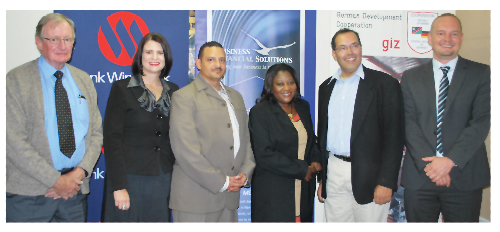
SME equity tested for value

The partners who commissioned the study on “Private Equity Initiative for Emerging SMEs are from the left: Tim Parkhouse (Global Compact Network Namibia/NEF); Marlize Horn (Bank Windhoek); Fabian Tait (BFS); Kauna Ndilula (BFS); Robin Sherbourne (Economist) and Daniel Bagwitz (GIZ)
The study will also investigate the relevance for supporting SMEs to access equity capital. Under the title “Study on a Private Equity Initiative for Emerging SMEs in Namibia” the research will be done by local economist, Robin Sherbourne.
In a joint statement, the instructing partners said “This partnership shows the commitment of the parties to support the objective and vision set out in the Namibia Financial Sector Strategy to improve access to financial products and services and thereby contribute to the economic growth and development and the reduction of poverty and inequality.”
At the signing of the Memorandum of Understanding, the Chairman of BFS, Mr Fabian Tait said, “As a small player in the financial market, BFS is committed to the development of the financial market and continues to play a catalytic role. BFS however recognis es the fact that it cannot have the desired impact on its own and as such strives to work with like-minded and pioneering stakeholders such as the GIZ, Global Compact and Bank Windhoek, institutions that have made significant contributions in SME development in their own right. Similarly, in understanding the needs for alternative finance to SMEs, BFS commissioned the study on equity finance for emerging enterprises and profoundly appreciate the support by Bank Windhoek and GIZ and Global Compact Network to co-finance this study”.
Testing the viability of SME equity is driven by the anticipated changes to Regulation 29 of the Pension Fund Act which requires pension funds to invest in so-called Special Purpose Vehicles facilitated by an Unlisted Investment Manager. Regulation 29, in turn, is driven by the new requirements under Regulation 28 forcing pension funds to invest a minimum of 1.75% and a maximum of 3.5% of assets in unlisted investments. These changes are expected to be promulgated by December this year.
The biggest challenge for the study is to determine what the definition of an SME is.










































